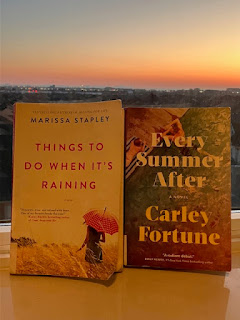Familiarity Breeds Contempt? Not So...
There’s an old saying that goes:
Familiarity Breeds Contempt.
I’m not sure how it originated or what it
was trying to say. Yes, I can google it, but I prefer not to. I would rather
imagine my own interpretations.
I assume it implied that once you got to
know someone too well, all their foibles and idiosyncrasies, saw them in their
daily domestic chaos, you would tire of them. Once they become familiar, not
only would you stop caring about them, you would look upon them with disdain.
If this was indeed the intention and
meaning of the saying, then it portrays a special kind of bleakness.
Because shouldn’t caring be the exact
opposite of that? Once someone becomes familiar to you, then they become dearer.
Familiarity breaks down barriers. It increases your empathy when you see
someone for who they are, warts and all, someone like you.
The reason I’ve been thinking these
thoughts are several, but here’s one in particular:
These two recent reads that I enjoyed, both written by Toronto area writers. A common thread: attachments formed early in childhood friendships, that blossom into love, tested by periods of separation and estrangement. A familiarity that began early and created deep roots.
And here’s something funny that happens
when you read books by writers who are local; when you recognize some of the
places named in the books: You start avidly rooting for the writer and the
story. You become much more forgiving of minor things, a passage or two, where
you may not have been fully drawn in.
I’ve also observed this when travelling
abroad. If I meet Canadians in a foreign country, I will gravitate to them
instantly, even if I would hardly pay attention to them at home. In a line-up
outside a museum in Madrid, I happily chatted to a Canadian couple. If I were
in a line-up in Toronto or Oakville? It would most likely be different.
What if we were to take that and expand it on a larger scale? Not just writers, or fellow travellers abroad, but people in our community, in the grocery store, at the train station, the airport, on the street? Once we see them as one of us, not the other, our empathy kicks in.
I’m often guilty of getting frustrated and
annoyed with people who act with thoughtlessness and inconsideration: those dog
walkers who don’t pick up, the person who allows the door to smack the person
behind them, the loud talkers in public places. Okay, a lot of those behaviours
may be boorish and rude. But…what if…that person was one of us having a bad
moment? The dog walker: my uncle with a bad back. The door slammer: my friend
in a hurry to see her mom in the hospital. The loud talker: an aunt who is hard
of hearing. They would be forgiven.
Recently, a friend was relating a small
kindness routinely performed by a friend of hers. You know those call centers
you get transferred to that are in another country? We are often frustrated by
this. But this friend of hers, when she doesn’t understand the person at the
other end of the phone because of the heavily accented English, will say: Would
you mind repeating that? I’m quite deaf.
Oh, the small, simple kindness of that!
Instead of familiarity breeding contempt, I
would argue the opposite is true. It’s when people become real to us, that our
hearts open with compassion.




Pearl, I love this! I concur--familiarity breeds understanding and sometimes love. I'm very much enjoying getting to know my fellow writers.
ReplyDelete